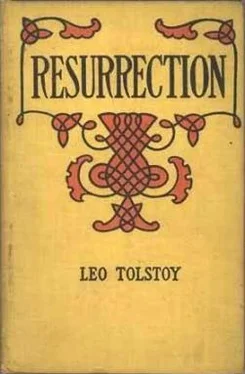Leo Tolstoy - Resurrection
Здесь есть возможность читать онлайн «Leo Tolstoy - Resurrection» весь текст электронной книги совершенно бесплатно (целиком полную версию без сокращений). В некоторых случаях можно слушать аудио, скачать через торрент в формате fb2 и присутствует краткое содержание. Жанр: Русская классическая проза, на английском языке. Описание произведения, (предисловие) а так же отзывы посетителей доступны на портале библиотеки ЛибКат.
- Название:Resurrection
- Автор:
- Жанр:
- Год:неизвестен
- ISBN:нет данных
- Рейтинг книги:4 / 5. Голосов: 1
-
Избранное:Добавить в избранное
- Отзывы:
-
Ваша оценка:
- 80
- 1
- 2
- 3
- 4
- 5
Resurrection: краткое содержание, описание и аннотация
Предлагаем к чтению аннотацию, описание, краткое содержание или предисловие (зависит от того, что написал сам автор книги «Resurrection»). Если вы не нашли необходимую информацию о книге — напишите в комментариях, мы постараемся отыскать её.
Resurrection — читать онлайн бесплатно полную книгу (весь текст) целиком
Ниже представлен текст книги, разбитый по страницам. Система сохранения места последней прочитанной страницы, позволяет с удобством читать онлайн бесплатно книгу «Resurrection», без необходимости каждый раз заново искать на чём Вы остановились. Поставьте закладку, и сможете в любой момент перейти на страницу, на которой закончили чтение.
Интервал:
Закладка:
II
Maslova’s early life.
The story of the prisoner Maslova’s life was a very common one.
Maslova’s mother was the unmarried daughter of a village woman, employed on a dairy farm, which belonged to two maiden ladies who were landowners. This unmarried woman had a baby every year, and, as often happens among the village people, each one of these undesired babies, after it had been carefully baptised, was neglected by its mother, whom it hindered at her work, and left to starve. Five children had died in this way. They had all been baptised and then not sufficiently fed, and just left to die. The sixth baby, whose father was a gipsy tramp, would have shared the same fate, had it not so happened that one of the maiden ladies came into the farmyard to scold the dairymaids for sending up cream that smelt of the cow. The young woman was lying in the cowshed with a fine, healthy, new-born baby. The old maiden lady scolded the maids again for allowing the woman (who had just been confined) to lie in the cowshed, and was about to go away, but seeing the baby her heart was touched, and she offered to stand godmother to the little girl, and pity for her little god-daughter induced her to give milk and a little money to the mother, so that she should feed the baby; and the little girl lived. The old ladies spoke of her as “the saved one.” When the child was three years old, her mother fell ill and died, and the maiden ladies took the child from her old grandmother, to whom she was nothing but a burden.
The little black-eyed maiden grew to be extremely pretty, and so full of spirits that the ladies found her very entertaining.
The younger of the ladies, Sophia Ivanovna, who had stood godmother to the girl, had the kinder heart of the two sisters; Maria Ivanovna, the elder, was rather hard. Sophia Ivanovna dressed the little girl in nice clothes, and taught her to read and write, meaning to educate her like a lady. Maria Ivanovna thought the child should be brought up to work, and trained her to be a good servant. She was exacting; she punished, and, when in a bad temper, even struck the little girl. Growing up under these two different influences, the girl turned out half servant, half young lady. They called her Katusha, which sounds less refined than Katinka, but is not quite so common as Katka. She used to sew, tidy up the rooms, polish the metal cases of the icons and do other light work, and sometimes she sat and read to the ladies.
Though she had more than one offer, she would not marry. She felt that life as the wife of any of the working men who were courting her would be too hard; spoilt as she was by a life of case.
She lived in this manner till she was sixteen, when the nephew of the old ladies, a rich young prince, and a university student, came to stay with his aunts, and Katusha, not daring to acknowledge it even to herself, fell in love with him.
Then two years later this same nephew stayed four days with his aunts before proceeding to join his regiment, and the night before he left he betrayed Katusha, and, after giving her a 100-rouble note, went away. Five months later she knew for certain that she was to be a mother. After that everything seemed repugnant to her, her only thought being how to escape from the shame that awaited her. She began not only to serve the ladies in a half-hearted and negligent way, but once, without knowing how it happened, was very rude to them, and gave them notice, a thing she repented of later, and the ladies let her go, noticing something wrong and very dissatisfied with her. Then she got a housemaid’s place in a police-officer’s house, but stayed there only three months, for the police officer, a man of fifty, began to torment her, and once, when he was in a specially enterprising mood, she fired up, called him “a fool and old devil,” and gave him such a knock in the chest that he fell. She was turned out for her rudeness. It was useless to look for another situation, for the time of her confinement was drawing near, so she went to the house of a village midwife, who also sold wine. The confinement was easy; but the midwife, who had a case of fever in the village, infected Katusha, and her baby boy had to be sent to the foundlings’ hospital, where, according to the words of the old woman who took him there, he at once died. When Katusha went to the midwife she had 127 roubles in all, 27 which she had earned and 100 given her by her betrayer. When she left she had but six roubles; she did not know how to keep money, but spent it on herself, and gave to all who asked. The midwife took 40 roubles for two months’ board and attendance, 25 went to get the baby into the foundlings’ hospital, and 40 the midwife borrowed to buy a cow with. Twenty roubles went just for clothes and dainties. Having nothing left to live on, Katusha had to look out for a place again, and found one in the house of a forester. The forester was a married man, but he, too, began to annoy her from the first day. He disgusted her, and she tried to avoid him. But he, more experienced and cunning, besides being her master, who could send her wherever he liked, managed to accomplish his object. His wife found it out, and, catching Katusha and her husband in a room all by themselves, began beating her. Katusha defended herself, and they had a fight, and Katusha got turned out of the house without being paid her wages.
Then Katusha went to live with her aunt in town. The aunt’s husband, a bookbinder, had once been comfortably off, but had lost all his customers, and had taken to drink, and spent all he could lay hands on at the public-house. The aunt kept a little laundry, and managed to support herself, her children, and her wretched husband. She offered Katusha the place of an assistant laundress; but seeing what a life of misery and hardship her aunt’s assistants led, Katusha hesitated, and applied to a registry office for a place. One was found for her with a lady who lived with her two sons, pupils at a public day school. A week after Katusha had entered the house the elder, a big fellow with moustaches, threw up his studies and made love to her, continually following her about. His mother laid all the blame on Katusha, and gave her notice.
It so happened that, after many fruitless attempts to find a situation, Katusha again went to the registry office, and there met a woman with bracelets on her bare, plump arms and rings on most of her fingers. Hearing that Katusha was badly in want of a place, the woman gave her her address, and invited her to come to her house. Katusha went. The woman received her very kindly, set cake and sweet wine before her, then wrote a note and gave it to a servant to take to somebody. In the evening a tall man, with long, grey hair and a white beard, entered the room, and sat down at once near Katusha, smiling and gazing at her with glistening eyes. He began joking with her. The hostess called him away into the next room, and Katusha heard her say, “A fresh one from the country,” Then the hostess called Katusha aside and told her that the man was an author, and that he had a great deal of money, and that if he liked her he would not grudge her anything. He did like her, and gave her 25 roubles, promising to see her often. The 25 roubles soon went; some she paid to her aunt for board and lodging; the rest was spent on a hat, ribbons, and such like. A few days later the author sent for her, and she went. He gave her another 25 roubles, and offered her a separate lodging.
Next door to the lodging rented for her by the author there lived a jolly young shopman, with whom Katusha soon fell in love. She told the author, and moved to a little lodging of her own. The shopman, who promised to marry her, went to Nijni on business without mentioning it to her, having evidently thrown her up, and Katusha remained alone. She meant to continue living in the lodging by herself, but was informed by the police that in this case she would have to get a license. She returned to her aunt. Seeing her fine dress, her hat, and mantle, her aunt no longer offered her laundry work. As she understood things, her niece had risen above that sort of thing. The question as to whether she was to become a laundress or not did not occur to Katusha, either. She looked with pity at the thin, hard-worked laundresses, some already in consumption, who stood washing or ironing with their thin arms in the fearfully hot front room, which was always full of soapy steam and draughts from the windows, and thought with horror that she might have shared the same fate.
Читать дальшеИнтервал:
Закладка:
Похожие книги на «Resurrection»
Представляем Вашему вниманию похожие книги на «Resurrection» списком для выбора. Мы отобрали схожую по названию и смыслу литературу в надежде предоставить читателям больше вариантов отыскать новые, интересные, ещё непрочитанные произведения.
Обсуждение, отзывы о книге «Resurrection» и просто собственные мнения читателей. Оставьте ваши комментарии, напишите, что Вы думаете о произведении, его смысле или главных героях. Укажите что конкретно понравилось, а что нет, и почему Вы так считаете.












